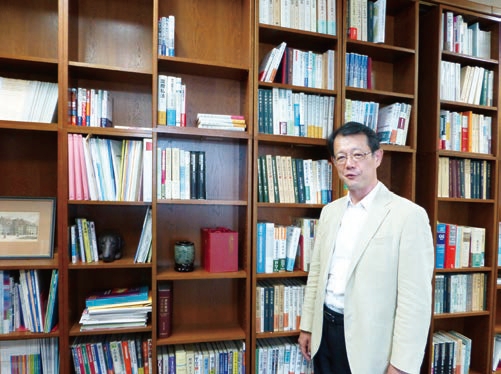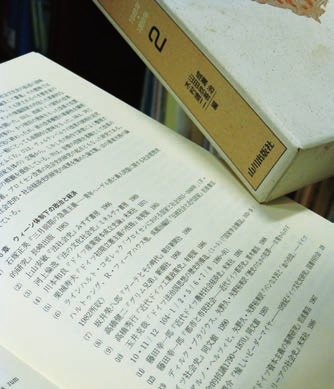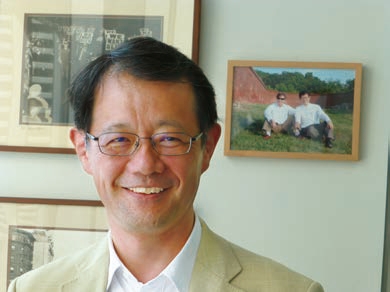- HOME
- Research
- Research Archives
- RCAST LAB tours
- Tamai LaboratoryHow to Protect Japan's Intellectual Power
Tamai Laboratory
How to Protect Japan's Intellectual Power
Social sciences at RCAST? Perhaps due to the "Science and Technology" in RCAST's name, many people are surprised that social science is one of RCAST's research fields. However, the results of scientific and technological research, and the process of commercializing it, all involve “assets worth protecting,” produced by the intellectual power behind this research.
The Laboratory of Professor Tamai engages in research regarding intellectual property law, essential for science and technology management for everything from international competition to corporate management strategy. Let us explore the world of patent rights and copyrights behind the products and services we use every day.
How will Japan deal with this age, not of products, but of added value?

The shelves contain roughly 3,000 booksThe satellite office of the Laboratory of Professor Tamai, which specializes in intellectual property law, is located in a high-rise building connected to Tokyo Station, in sharp contrast to RCAST, which is located in one of the rather secluded parts of Komaba. It offers a wide-open panorama of the city, and the walls are lined with packed bookshelves. It exudes refinement. “The number of books just keeps on growing, and it's a very convenient location for meeting with companies,” says Professor Tamai. Intellectual property law is law which, instead of protecting physical property, protects the results of intellectual activity, the expressions of accomplishments, and technologies. Developed countries recognize its importance, but in recent years Asian countries such as China have also been focusing on intellectual property education. “We've entered an era in which the value added by IP is far greater than the value of physical goods. Japan's mindset is still one of a manufacturing-oriented nation. People are still wondering how companies who do not create physical objects can make so much money.”
Professor Tamai is very keen about discussiong with overseas researchers and specialists, and is on particularly friendly terms with Prof. Randall Rader, former Chief Judge of the United States Court of Appeals for the Federal Circuit, the US patent court.
“It doesn't make sense that the highest-level researchers who have raised Japan from the ashes of the war to prosperity make far less, by an order of magnitude, than professional athletes and comedians. There are more Japanese with the gifts to become researchers than the gifts to become baseball players. A world-class baseball player can make 5 billion yen, so I want our society to be one in which several hundred of the many researchers out there can earn 5 billion yen over the courses of their careers,” says Professor Tamai.
However,“Being awarded 100 million yen by Japanese courts is like being awarded 100 million dollars in American courts, even though it's 100 times less.” The attitudes towards IP in Japan differ greatly from those in the rest of the world, especially the U.S.A.
Educating a growing number of Asian IP professionals
Professor Tamai's principal research areas are trade secrets, standard essential patents, and employee inventions. Going forward, the most pressing area is “trade secrets.” Though long overlooked, overshadowed by the patent system, it is becoming recognized as an extremely important area of IP law. “For example, consider the Nippon Steel Corporation (now the Nippon Steel & Sumitomo Metal Corporation) grain-oriented electrical steel sheet lawsuit. This industrial spying lawsuit concerns the technology for manufacturing special steel material which, used in transformers and power transmission equipment, dramatically reduces power transmission loss, cutting power consumption by roughly 10%.” While there are many IP lawsuits, this one stands out for the amount of damages being sought — 98.6 billion yen. Professor Tamai is providing his full cooperation in the case.
Western companies are at the forefront of systems for defending against information leakage and industrial spying, but there are also budding but active movements in developing countries such as Taiwan and China. “Taiwan's Multidisciplinary Management of Technolog (MMOT) program has secured national budgeting and is offering an overseas training program for around 40 students each year. These students study in places such as the U.S., Germany, and Tokyo. My lab coordinates the Tokyo training, arranging lectures by professionals, tours of Japanese companies, and visits to sites of Industry-Academia Collaboration activities at the University of Tokyo.” Peking University is considering different measures than Taiwan MMOT, and there are concerns that “as different countries work to protect their own intellectual property, if Japan continues with its conventional approach, differences in personnel capabilities may lead to vast differences in global competitiveness.” So, how should we be training our IP personnel? This is a field that is directly connected to business, so it requires personnel who not only are knowledgeable about the law, but are also well-versed in specific technical fields and in business. This presents a major problem.
“Actually, intellectual property is an under-addressed field in American MBA programs as well. It's a hands-on educational field, so I think it would be good if major Japanese companies would attempt to create their own internal IP schools, combining their intellectual property, management, and technologies, and cultivated a number of IP professionals each year. I would love to provide my assistance.”
Closely and thoroughly examining overseas cases

Before studying intellectual property, Professor Tamai studied the history of German administrative law. His papers are even quoted in high school textbooks“Unlike experimental research, our research does not create new knowledge.” RCAST is primarily focused on carrying out experimentation in order to make new discoveries. What kind of “advanced” research is being conducted in the social sciences, in RCAST's only legal research lab?
“The FBI posts examples of trade secret thefts it has discovered. There have been unbelievable cases where industrial spies have become naturalized citizens and spied for decades. This information is invaluable to Japan, but it is unknown and unread here. Nobody is putting in a form that Japanese people need and communicating this information. That's what I believe I, as a legal scholar, need to do.” Tamai's laboratory uses publicly disclosed information. It isn't experimentally derived data or new knowledge, but it is new to the Japanese people and authorities.
“I look at all the disclosed information, I read all the laws concerning economic secrets — I'm thorough and careful. Because of time limitations I sometimes have to give up on doing other research, but that's because my job is to provide recommendations on what kinds of laws Japan could create for the country's own benefit.” Professor Tamai does everything, from database searches to inquiries and analysis, on his own. “Though I do ask students who are fluent in Chinese about information in Chinese language sources,” he adds. This information is reflected in future measures to protect Japan's intellectual property.
Three reasons why it is important to study U.S. intellectual property law
1. Commanding “defensive” and “offensive” approaches in actual business operations
| Defense | Operational knowledge necessary to avoid accidentally engaging in serious crimes such as interfering with FBI investigations or violating monopoly laws |
|---|---|
| Offense | Operational knowledge necessary to involve US investigative authorities when there is a possibility that one’s trade secrets have been stolen |
2. For reference in developing legislation to protect Japanese intellectual property
When the same trade secrets are held in Japan and the U.S., the Japanese trade secrets are targeted due to Japan’s weak trade secret laws and mild penalties. It is important to study U.S. intellectual property law to be able to consider how to structure and implement legal systems which are functionally equivalent to those of the U.S.
3. Understand culture and background
For example, consider the differences in mentality with regard to trade secrets
| Japan | “It's just a money issue, it's not like anyone has died”(not taken seriously) |
|---|---|
| U.S. | “This is a shameless crime which weakens the willingness of U.S. companies to invest and places the nation’s economic prosperity in jeopardy." |
Researcher Profile

- My time as an exchange student in Germany, which coincided with the collapse of Eastern European socialism and the unification of East and West Berlin, is what led me to shift from administrative law to intellectual property law. Things you never expect are always happening. My whole value system changed — I wasn't content to live the uneventful life on rails which I saw stretching out in front of me, starting from the University of Tokyo Faculty of Law. If I hadn't had this experience, I probably would have shrunk away from the opportunity to work at RCAST,” laughs Professor Tamai.
He says that his personal network has expanded through the use of twitter, which he began using to communicate law concepts to students. “You've got to get out into the greater world. If something seems interesting, try it. If you can go somewhere, go. That's what led me to take my family to Budapest for summer vacation.”
Our interview with Professor Tamai was conducted the day after he returned to Japan. He recalled his days as an exchange student in Eastern Europe as if they were just yesterday.
Tags

